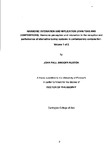HARMONIC INTONATION AND IMPLICATION (ANALYSES AND COMPOSITIONS): Harmonic perception and intonation in the reception and performance of alternative tuning systems in contemporary composition
| dc.contributor.author | SWOGER-RUSTON, JOHN PAUL | |
| dc.contributor.other | Faculty of Arts, Humanities and Business | en_US |
| dc.date.accessioned | 2013-10-30T11:38:11Z | |
| dc.date.available | 2013-10-30T11:38:11Z | |
| dc.date.issued | 2006 | |
| dc.identifier | NOT AVAILABLE | en_US |
| dc.identifier.uri | http://hdl.handle.net/10026.1/2473 | |
| dc.description.abstract |
Most composers and theorists will acknowledge that some compromise is necessary when dealing with the limitations of human performance, perception, and the realities of acoustic theory. Identifying the thresholds for pitch discrimination and execution is an important point of departure for defining workable tuning schemes, and for training musicians to realise compositions in just intonation and other alternative tuning systems. The submitted paper 'HARMONIC INTONATION AND IMPLICATION (ANALYSES AND COMPOSITIONS): Harmonic perception and intonation in the reception and performance of alternative tuning systems in contemporary composition' is a phenomenological study of harmonic perception and intonation through the analysis of recordings, scores, theoretical papers, and discussion with practicing musicians. The examined repertoire covers western 'art' music of the late nineteenth to early twenty-first centuries. I approach my research from the composer's point of view though filtered through the ears and eyes of the performer, who is here considered 'expert listener'. lt is considered that intonation is a dynamic experience subject to influences beyond just intonation or equal temperament (the two poles for intonational reference)-the performance is assumed 'correct', rather than the idealised version of the composer. My goal is to relate the performance to the intentions of the composer and raise questions regarding the choice of notation, resolution of the tuning systems, the complexity of the harmonic concept, etc. and perhaps to suggest how to extend a general theory of harmony that embraces both musical practice and psychoacoustics. lt is with the understanding that harmonic implication affects intonation, but that intonation is subject to several other forces making intonation a complex system (and therefore not fully predictable). | en_US |
| dc.language.iso | en | en_US |
| dc.publisher | University of Plymouth | en_US |
| dc.title | HARMONIC INTONATION AND IMPLICATION (ANALYSES AND COMPOSITIONS): Harmonic perception and intonation in the reception and performance of alternative tuning systems in contemporary composition | en_US |
| dc.type | Thesis | |
| plymouth.version | Full version | en_US |
| dc.identifier.doi | http://dx.doi.org/10.24382/4624 |
Files in this item
This item appears in the following Collection(s)
-
01 Research Theses Main Collection
Research Theses Main



